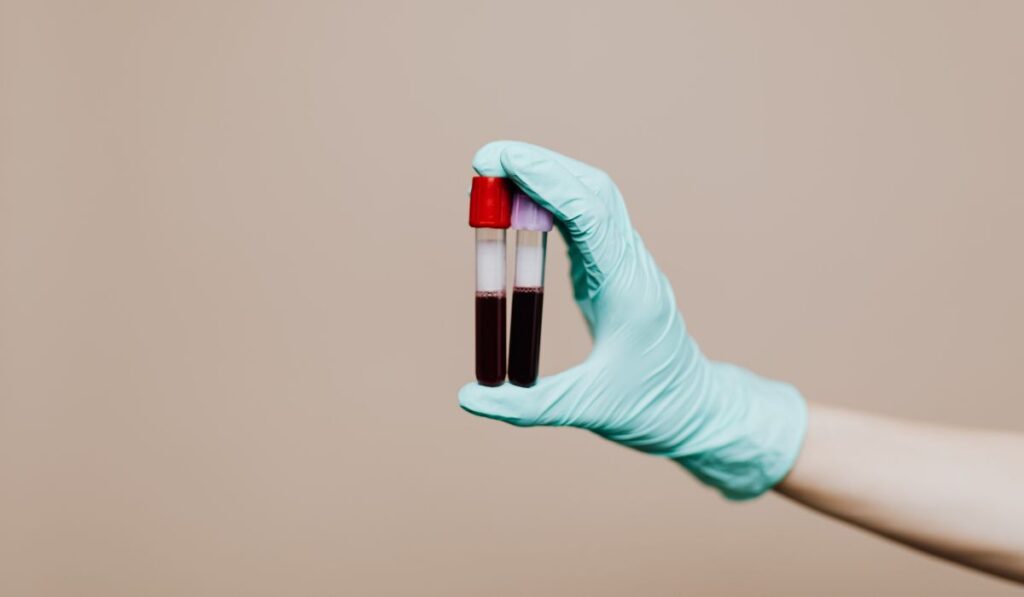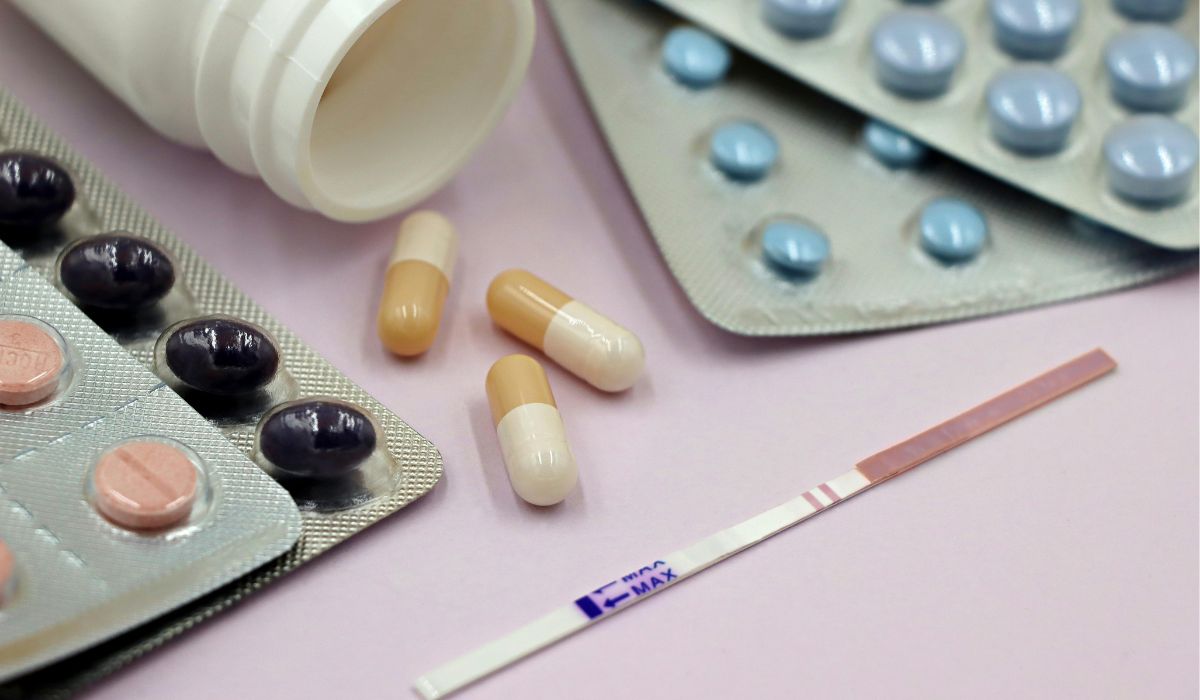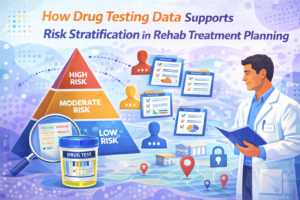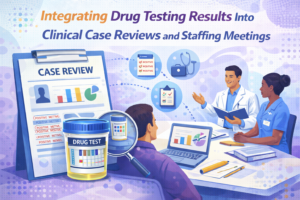Does Alprazolam Show Up in a Drug Test?
Alprazolam is a medicine that belongs to a group called benzodiazepines. Doctors often prescribe it to help people with anxiety disorder, panic disorder, or agoraphobia. It works by calming the central nervous system and the brain.
At Lynk Diagnostics, we provide professional drug testing for rehab facilities, focusing on accuracy, sensitivity and specificity, and patient care.
Clinically Reviewed by Kristina Westerdahl

What Is Alprazolam?
Alprazolam is an anxiolytic medicine that affects a brain chemical called GABA (gamma-aminobutyric acid). This neurotransmitter slows signals in the brain, leading to relaxation, lower heart rate, and better mood.
Doctors use alprazolam to treat:
- Panic attacks
- Anxiety
- Insomnia
- Sleep problems caused by anxiety
- Agoraphobia
It is a controlled substance approved by the Food and Drug Administration. Misuse can lead to physical dependence, addiction, or benzodiazepine use disorder.
How Does Alprazolam Work in the Body?
When you take alprazolam, it is absorbed into your blood through the stomach. The liver breaks it down using enzymes. The broken-down parts are called metabolites.
These metabolites travel through your nervous system, muscles, and adipose tissue (fat) before leaving your body through urine, saliva, or hair.
This process is called metabolism and absorption, and it’s part of pharmacokinetics — how a medicine moves through the body.
Does Alprazolam Show Up in a Drug Test?
Yes, alprazolam can be found in:
- Urine test / urinalysis
- Blood test
- Saliva testing
- Hair follicle testing
At Lynk Diagnostics, we use toxicology screening methods like immunoassay for fast results, and more advanced lab testing for confirmation.
How Long Does Alprazolam Stay in the Body?
The time alprazolam stays in your body depends on:
- Dose you take
- Frequency of use
- Metabolism speed
- Medical history and disease
- Weight loss or body fat level
- Age and overall health care condition
On average:
- Urine test: up to 4 days
- Blood test: up to 24 hours
- Saliva testing: 2–3 days
- Hair follicle: up to 90 days

Factors That Affect Detection
1. Metabolism and Absorption
People with faster metabolism may clear the drug faster. Pregnancy, breastfeeding, and liver function can also change results.
2. Frequency and Dose
Daily benzodiazepine use builds up in the tissue, making it stay longer.
3. Health and Medical History
Conditions like epilepsy, multiple sclerosis, or disease affecting the nervous system can change how long the drug stays.
Types of Drug Tests for Alprazolam
Urine Test / Urinalysis
Most common for substance abuse monitoring. Good for rehab or mental health treatment programs.
Blood Test
Shows recent use, often used in hospital psychiatry or emergency settings.
Saliva Testing
Less invasive, can detect use within the last few days.
Hair Follicle Test
Detects substances like alprazolam for months, useful for recovery village-type long-term monitoring.
Why Rehab Centers Test for Alprazolam
Rehab facilities and mental health professionals often test for alprazolam because it can be misused with alcohol, opioids, or stimulants like codeine or fentanyl.
Mixing these substances can slow breathing, lower blood pressure, and cause dangerous seizure or coma.
Risks of Misuse
Misusing alprazolam can cause:
- Memory problems
- Poor mood control
- Slow reaction and concentration
- Risk of addiction and physical dependence
Over time, people may need detoxification and therapy for safe withdrawal.
Alprazolam and Dual Diagnosis
Some patients have dual diagnosis, meaning they have a mental health condition like anxiety disorder or depression along with substance abuse.
A mental health professional or physician will create a mental health treatment plan that may include:
- Therapy
- Exercise and stress management
- Coping skills
- Safe detoxification
Similar Medicines That Show Up in Drug Tests
Other benzodiazepines that may appear in a drug test include:
- Diazepam
- Lorazepam
- Clonazepam
- Oxazepam
- Temazepam
- Flunitrazepam
- Triazolam
- Midazolam
How to Prepare for a Drug Test
If you are a patient taking alprazolam as prescribed:
- Bring your medical history and prescription.
- Tell the health professional about all medication you take, including sertraline or other medicine for mental health.
- Avoid alcohol or other controlled substances unless approved by your doctor.
Can Food, Drink, or Exercise Change Results?
- Drink water to stay hydrated, but too much can dilute the fluid and lower sensitivity and specificity of the test.
- Some exercise and healthy eating may help your metabolism, but it won’t erase traces overnight.
- Certain behavior, like mixing with stimulants or opiates, can create false positives or dangerous effects.
When to Seek Help
If you feel you are misusing alprazolam, mixing it with alcohol or opioids, or having withdrawal symptoms like panic, fear, or seizure, talk to a mental health professional right away.
Lynk Diagnostics works closely with rehab centers and health care providers to support recovery and substance abuse treatment.

FAQs
Does alprazolam show up in every drug test?
Not always. It depends on the type of screening, the dose, and how your body processes the drug.
How can I prove my alprazolam use is legal?
Bring your prescription and medical history to the physician or health professional at the testing site.
Can alprazolam be mistaken for other drugs?
Yes, some immunoassay tests may show false positives for other benzodiazepines like diazepam or clonazepam.
How long should I wait before taking a test?
For most people, waiting at least 4–5 days after your last dose can help clear it, but hair follicle tests can detect it for months.
Is it dangerous to stop alprazolam suddenly?
Yes. Sudden stop can cause seizure, panic attack, or severe anxiety. Always work with a mental health professional on safe detoxification. Contact us for more information.








